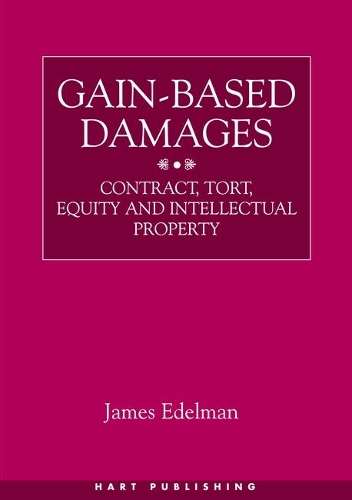
Gain-Based Damages: Contract, Tort, Equity and Intellectual Property
(Hardback)
Publishing Details
Gain-Based Damages: Contract, Tort, Equity and Intellectual Property
By (Author) James Edelman
Bloomsbury Publishing PLC
Hart Publishing
19th April 2002
United Kingdom
Classifications
Tertiary Education
Non Fiction
347.42077
Winner of Society of Legal Scholars Prize for Outstanding Legal Scholarship 2003 (UK)
Physical Properties
Hardback
320
Width 156mm, Height 234mm, Spine 25mm
656g
Description
This text considers the nature of gain-based damages and explains when they have historically been available and why, and provides a framework for appreciating the operation of such damages awards. The first part of the book justifies the existence of these damages, which focus upon a defendant wrongdoer's gain made as a result of a civil wrong, explaining the nature and need for such a remedy and the scope of civil wrongs. The core thesis of the book is that two different forms of such gain-based damages exist: the first is concerned with restitution of a defendant's gains wrongfully transferred from a claimant; the second is concerned only with stripping profits from the defendant's hands. The two different awards are based on different rationales. The second part of the book considers and applies this approach, demonstrating its operation throughout the cases of civil wrongs. The operation of the two forms is demonstrated in cases in the areas of tort, contract, equitable wrongs and intellectual property wrongs.
Reviews
a thought-provoking account of an exceedingly difficult aspect of the law of remedies provides ample food for thought and deserves appropriate attention. -- Sarah Worthington, London School of Economics * Trust Law International *
the book is carefully cited and easily navigable it is worthy both as a guide for practitioners and resource for academics. the logic with which Dr Edelman presents his case for recognition of gain-based damages for civil wrongs is appealing. Each step in the argument follows convincingly from the previous one. And the force of recent case law, in particular the seminal House of Lords decision in Attorney-General v Blake (where disgorgement damages for breach of contract were awarded), only serves to strengthen the argument. -- Michael Rush, Magdalen College, Oxford * Australian Bar Review *
Author Bio
James Edelman was a lecturer at St Edmund Hall, Oxford and now researches and teaches at the University of Western Australia.
